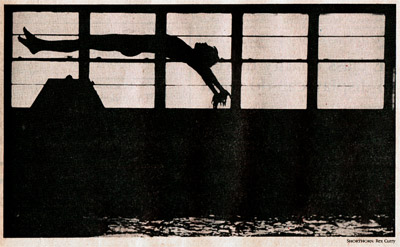Handling Daylight Savings Time in ColdFusion
SportsFilter has been misreporting the time on posts and comments since the U.S. sprang forward, reporting times in CST instead of CDT.To fix the problem, I wrote a few lines of ColdFusion code to set a tzid variable to the proper timezone identifier:
<cfset tzinfo = GetTimeZoneInfo()>
<cfset tzid = "CST">
<cfif tzinfo.isDSTOn IS "True">
<cfset tzid = "CDT">
</cfif>
Buzzword.Com Will Shut Down May 21
Buzzword.Com will shut down on May 21, which means the last two dozen weblogs on the free Manila hosting service have one month to find a new home.I've enjoyed running the server for the past two years, but I'm doing all of my work these days on Linux servers running Java, Apache, MySQL and PHP. Buzzword runs on UserLand Frontier with Windows 2000 Server.
All Buzzword weblogs can keep using their domain names after they move, so Google pagerank and existing traffic won't be lost. I'll provide free name service for any publisher who requests it.
There are several options for bloggers to consider:
- Move your site without modification to a commercial Manila host. Erin Clerico of Weblogger.Com has offered Buzzword users a discount -- the first year of hosting for $49.95 -- and UserLand also provides commercial hosting.
- Move your site to Movable Type, WordPress or another tool that supports Movable Type's export format.
- Create an HTML archive of your existing site.
The easiest option is to stay on Manila. BookNotes is moving to Weblogger.Com today, and it takes around 10 minutes to export the site, copy the files over and install it on the new server.
Moving to other weblogging software takes around 8-16 hours, depending on the size of the weblog, and requires some testing to ensure that all links and images continue to work properly. Some features won't be copied over, such as the site's blogroll and page templates, but all weblog entries, articles and images will be transferred.
Creating an HTML archive takes 1-2 hours, but you won't be able to edit the site afterward with Manila or any other blogging tool.
Buzzword users should let me know which option you'd like to pursue. I can package sites for export to another Manila host at no cost and handle the other options for a fee.
When I launched Buzzword, the server was front-page news all over the place. A lot of bloggers wanted to know what I'd do with 3,018 sites that had been hosted on Weblogs.Com for years until they were taken offline in an abrubt shutdow-, er, server outage.
With a lot of help, I installed the blogs on a dedicated Super Celeron 2.4 Windows server at ServerMatrix that had a monthly 1,200 gigabyte bandwidth limit (later expanded to 1,400).
The server never exceeded 150 gigabytes a month in bandwidth, primarily because less than 100 of those 3,018 blogs were still active. My total cost for two years has been $2,200 -- a $400 setup charge plus $79 a month for hosting and backups -- and around 2-4 hours a week to keep the server ticking.
Weblog Mover For Hire
Cyndi Greening blogs about a programming job I did for her this month -- moving her filmmaking weblog from Radio UserLand to Movable Type:I have been complaining, whining and kvetching for over two years about how much I dislike using Radio UserLand as a blogging tool. When I started blogging in 2003, Radio was inexpensive and seemed easy to use. It had an automatic picture uploading tool. It had RSS features I liked.
But then ... I started traveling more and wanted to blog from film festivals like Sundance and SXSW and Tribeca but it was nearly impossible and totally frustrating. ...
Imagine my joy when Cadenhead (an author, consultant, teacher and total tech-head (I mean that in the nicest way possible) quickly and efficiently converted my 991 entries for transfer into IndieWIRE for a very reasonable fee. (My friends were so happy to hear I wouldn't be complaining about that anymore.) He even found a way to preserve the image links (refer to the screen snap for the nasty snarl of the deeply nested and separate folders that Radio creates). I wanted to get it done before Tribeca (which starts in six days) and he accomplished in record time.
I've written books on two blogging tools and used a half-dozen others on publishing projects. Moving from one blogging tool to another is a pain in the ass, whether you've outgrown Radio, Blogger, Movable Type, Manila or something else.
Greening's project revealed a thorny problem with how Radio encodes some characters in XML.
If anyone else needs a weblog mover enough to pay for the work, I'm available.
All Art Bell, All Romance, All the Time
I'm surprised the mainstream media has no interest in the love life of radio host Art Bell, which has become a lot more interesting than you'd expect of a 60-year-old man. In the last three days, more than 3,000 people have hit Workbench from search engines looking for information on Bell and wife, posting more than 480 comments.I covered the news because people were showing up here Sunday looking for it, thanks to this blog's top placement in Google for the term Art Bell's wife.
There's something deeply wrong about letting incoming traffic dictate the topics you cover, but I enjoy the idea of feeding the news jones of the world about any random subject that brings them here in great number.
I can't find a link to back it up, but I read about a newspaper in Mexico that makes editorial decisions based on the hit counts of stories when they go online. The most-read stories go on the front page and reporters receive bonuses based on traffic. The end result is a paper that favors attention-grabbing fluff and tabloid-style sensation over real news, which naturally caused subscriptions to skyrocket along with profits.
I've attached the audio of Bell telling his Coast to Coast listeners about his marriage Saturday night, which is every bit as weird as people are making it sound:
Airyn and I began having two- or three-hour videoconferences virtually every day. This is pretty personal stuff. In fact, after you have talked to someone for two or three hours and seen their picture in a videoconference, which can be done across the world, every single day, you get to know more about them than I think the average couple -- which usually jumps in bed with each other and then tries to find out about the other person afterwards -- will ever know. Still, you know, I still had not physically met Airyn but I was quickly falling in love. There's simply no question about it.
Radio · Journalism · 2006/04/19 · 274 COMMENTS · LinkCollege Pals Win Pulitzer Prizes for Katrina Coverage
While attending the University of Texas at Arlington from 1987-88, my wife and I wrote for The Shorthorn, a student newspaper filled with gifted, headstrong and completely insufferable journalists who were already clearing space on the mantle for Pulitzer Prizes.
We'd get into such gigantic battles at press time you'd have thought that students at the commuter school actually read the paper.
Two of my Shorthorn colleagues just won Pulitzers for breaking news photography: Michael Ainsworth and Tom Fox of the Dallas Morning News, part of an eight-member team that covered Hurricane Katrina.
Ainsworth and Fox were great photogs in college, so I'm not surprised they've developed the kind of talent you can lord over others.
Now that they've won something this huge, I wish I had dirt on them. But they were good guys who were easy to work alongside, with the exception of one time I butchered Fox's photo with poor cropping and he was disconsolate in grief for days.
The scanned photo that accompanies this entry didn't win the Pulitzer. It's a picture of Jaques Castro diving into a UT-Arlington pool in December 1987, taken by Rex Curry. Take a look at the enlarged version and you might notice something disturbing about the young swimmer.
This picture caused a huge fight among the photographers when I worked with Ainsworth and Fox.
The swimmer's silhouette originally contained a protuberance that dispelled the belief that pools cause shrinkage. While Photo Editor Leslie White was preparing it for publication, someone at the paper became concerned about the mindful of the delicate sensibilities of school administrators.
In an argument that hinged on the public's right to know, some photographers were not happy about Castro's transformation from convex to concave. I think the argument broke down along gender lines, with male Shorthorners troubled at the manner in which Castro had been denuded and White defending the crop.
White's the Morning News photo editor who assigned Ainsworth to cover Katrina, so they must have worked things out.
RSS Board Expands to 15 Members
The proposal to expand the RSS Advisory Board to 15 members and vote on them privately has passed 6-0.This opens seven spots that can be filled by developers, publishers and educators who'd like to help us work on matters related to RSS and syndication. If you're interested in joining, contact me and I'll pass it along to the board.
Art Bell Remarries, Will Leave U.S.
Paranormal radio host Art Bell told listeners on Coast to Coast AM last night that he has remarried, given his pet cats away and will be leaving the country, according to the show's web site:
During the first hour, Art shared the story of how he met, fell in love with, and married a very special Filipino woman, Airyn Ruiz. Art also announced that he will be moving to the Philippines on April 29 to be with Airyn, but will continue doing weekend Coast programs from that location.
Art Bell's wife Ramona died in January at age 47 of circulatory failure resulting from an asthma attack.
Last night, Bell announced his new marriage on the air and shared photos of the wedding to Ruiz, 21, who met him over e-mail after Ramona's death.
Bell broadcasts his late-night talk show and an FM oldies station from his home in Pahrump, Nevada, a desert town 50 miles from Las Vegas near Area 51. He left regular hosting duties behind on Coast to Coast in 2002 and now appears on weekends.
Some fans on an Art Bell online forum took the news personally:
What is even more shocking to me, is that he's leaving EVERYTHING behind ... the desert area, his home, his cats, the list is endless. ... I never would have thought a time would come when Art would go a day without his cats, no matter what. On his first show after Ramona died, he said that at one point, his cats were what kept him from suicide.
Update: I've posted the audio of Bell's announcement of the news on Coast to Coast.



